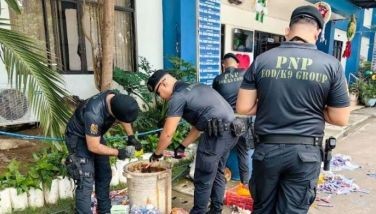Media helping media
CEBU, Philippines - Rehabilitation efforts in a calamity-stricken area primarily involve housing and infrastructure, among others.
Businesses and other establishments are usually on their own as they struggle to revive operations after super typhoon Yolanda.
In Tacloban City, one of the hardest-hit areas in Eastern Visayas, a group of concerned journalists focused on media rehabilitation while also targeting community empowerment.
The involvement of Peace and Conflict Journalism Network Philippines, Incorporated (PECOJON) evolved from providing relief assistance for affected media practitioners to putting up an emergency radio station.
Assessment on the situation, especially the plight of journalists in Eastern Visayas, was done one week after the typhoon hit. By the end of November, financial assistance and basic needs were extended to the survivors.
The move to go beyond momentary aid gradually materialized.
PECOJON was able to gather used and new equipment that could be used by Waray journos in continuing their profession of gathering news and feeding them to news organizations outside their city as livelihood while also making known to the world how their community is coping.
Radyo Abante was created. The emergency community radio station was set up January this year.
Broadcasting on a 40-kilometer radius from 5 a.m. to 9 p.m. the station was heard from its studio in Tacloban City to nearby Dulag, Alang-Alang, Dagami, Palo, Jaro and as far as Carigara in Leyte and Giparlos in Samar.
Radyo Abante’s first phase ran until May with German funding group Miserior. The second phase, also referred to as transition phase, is from June until this month now being funded by both Miserior and World Vision.
This time, the radio broadcast expanded to print media and film.
Currently known as Radyo Abante Multimedia (RAMM) network, it has since produced and aired over 50 public service plugs and at least 17 documentaries.
The newspaper that RAMM supports gets printed bi-monthly while the documentaries are produced once a week.
Listeners get to send in, via text message, their queries and concerns especially pertaining to aid and basic services in their locality.
“The primary goal of our project is to empower the community to demand for their rights. We can achieve this through Radyo Abante, by providing the right information they need. The beneficiaries of aid from both government and private institutions should not be taken as it is. We want them to know that they have the right to demand especially from the government. Helping the local journalists along the way is the secondary target,” project officer Joy Cherry Quito explained.
Quito used to be a Cebu-based newspaper journalist but decided to focus on the project in Eastern Visayas as she traces her maternal roots in the region while also being an alumna of University of the Philippines in Tacloban City.
The program has benefitted more than 50 journalists in Tacloban and Eastern Visayas.
Radio technician Wilson Catalan is one of the beneficiaries of the RAMM.
He was inside his former mother radio station, Radyo Diwa, when super typhoon Yolanda struck.
“I was with my two children then and four months pregnant wife. I brought them all at the station because I was on duty and we thought it would be safer there than in our home. We thought we were all gonna die but thank God we all survived. There were around 17 of us at the station because the families of my other colleagues were also there,” Catalan shared.
They had to walk around the city in search for food and possible temporary shelter hopping from houses of friends and relatives.
“Around last week of November, I was informed about a workshop by PECOJON. We did not know that a station will be put up. We were just told that there is this NGO which will help media practitioners who were affected by Yolanda. So we attended the training. Then we were told that we will compose the new station,” he added.
The time was just right for Catalan as he was already worried about how to feed his family.
“I really thank God for this opportunity. Because after Yolanda, I already gave up being in media since I said to myself it is impossible for my station to return on air considering the damage it sustained. But Radyo Abante happened,” he said.
The case of freelance broadcaster Allan Amistoso is considered by PECOJON as one success story.
Amistoso used to be a broadcaster affiliated with politicians and is now signifying intentions of not returning to this practice while hoping to be able to sustain contributing to legitimate media organizations.
“Before Yolanda happened, I already thought of changing and cleaning my image. In fact, I was already starting with my new broadcast career path. The eve of the typhoon, November 7 was my first day at Radyo Diwa and it turned out to be my last as well. With PECOJON, I was able to fulfill this goal which I thought would never happen when the typhoon struck,” Amistoso said.
Unfortunately, the RAMM project is set to end November 30. Quito however stressed they are trying to extend the project to help more. -/QSB (FREEMAN)
- Latest

























